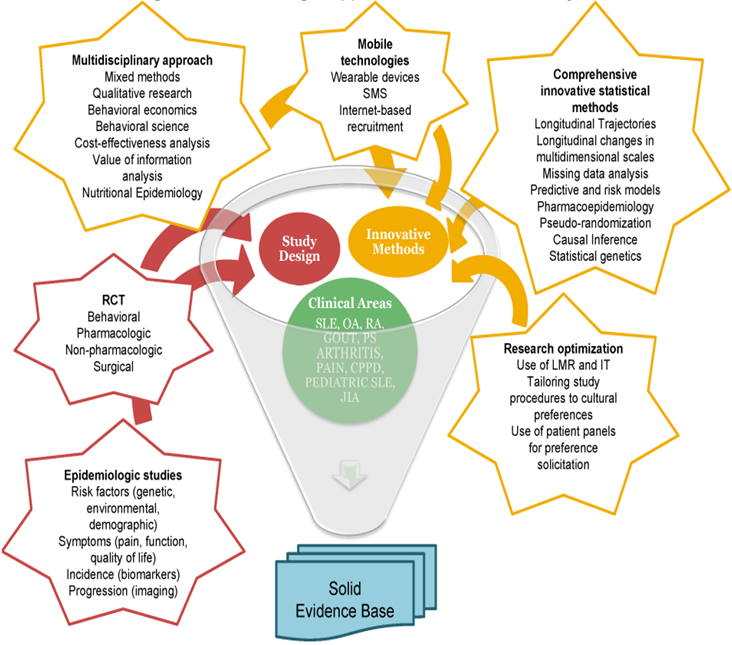The VERITY Methodology Core links innovative ideas from the Research Community with rigorous study designs, innovative trials, methods development, data management and analysis, compliance with data safety and Health Insurance Portability and Accountability Act (HIPAA) regulations, and clear reporting of findings.
 Rheumatic and musculoskeletal (MSK) disorders often persist for decades, have profound impact on quality of life, and require complex and costly management. Epidemiologic studies to identify persons at high risk for these disorders and to identify factors leading to worse prognosis merit a high priority. Clinical trials to establish treatment efficacy in these disorders are even more crucial. Both types of studies must account for the complexity of the phenotype and longevity of the clinical course, and they must address the balance between efficacy and toxicity in treatments for rheumatic and MSK disorders. The VERITY Methodology Core addresses these methodologic needs and challenges. The Core is a key centralized resource with the overarching goal of supporting investigators planning or conducting clinical research in patients with rheumatic or MSK disorders. Core faculty possess methodologic expertise in patient-centered research, comparative effectiveness studies, cost-effectiveness studies, behavioral interventions, and randomized controlled trials (RCTs). The faculty are adept at matching clinical questions to appropriate study designs and outcomes, developing and implementing statistical analysis plans, and optimizing data management systems and data collection methods.
Rheumatic and musculoskeletal (MSK) disorders often persist for decades, have profound impact on quality of life, and require complex and costly management. Epidemiologic studies to identify persons at high risk for these disorders and to identify factors leading to worse prognosis merit a high priority. Clinical trials to establish treatment efficacy in these disorders are even more crucial. Both types of studies must account for the complexity of the phenotype and longevity of the clinical course, and they must address the balance between efficacy and toxicity in treatments for rheumatic and MSK disorders. The VERITY Methodology Core addresses these methodologic needs and challenges. The Core is a key centralized resource with the overarching goal of supporting investigators planning or conducting clinical research in patients with rheumatic or MSK disorders. Core faculty possess methodologic expertise in patient-centered research, comparative effectiveness studies, cost-effectiveness studies, behavioral interventions, and randomized controlled trials (RCTs). The faculty are adept at matching clinical questions to appropriate study designs and outcomes, developing and implementing statistical analysis plans, and optimizing data management systems and data collection methods.
Aims of the Methodology Core
Aim 1: To ensure the highest possible methodological rigor in the design and implementation of studies aimed at improving outcomes in persons with rheumatic and musculoskeletal conditions.
Aim 2: To develop and advance methods to optimize design and conduct of clinical trials.
Aim 3: To incorporate intervention approaches based on behavioral theory and behavioral economic principles and to infuse into interventions cultural perspectives and perceptions of racial and ethnic minorities.
To access core services, you must be a VERITY member.
More information about VERITY membership.
